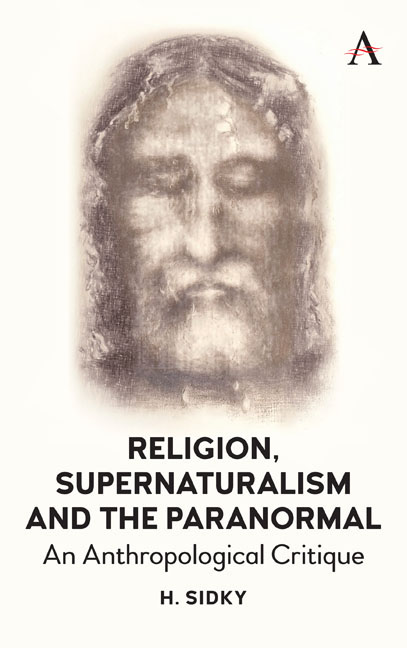Book contents
- Frontmatter
- Dedication
- Contents
- Acknowledgments
- Introduction
- Chapter One The Problem with Religion: Preliminary Issues
- Chapter Two The Unreal Real: The Supernatural, Religion, and the Paranormal
- Chapter Three Can Science Say Anything About Religion and the Supernatural?
- Chapter Four Ghostly Rappings, the Science of the Soul, and the Religious Nature of the Paranormal
- Chapter Five Ghostly Encounters in the Field: Anthropology of the Paranormal or Paranormal Anthropology?
- Chapter Six Why We Think the World Is Haunted
- Chapter Seven Cognitive Biases and Why People Think Eerie Thoughts
- Chapter Eight Miracles as Evidence of God's Actions in the World
- Chapter Nine When God Talks to People: Are Religious Experience Evidence of God?
- Chapter Ten Books Authored by God? Sacred Texts as Evidence of the Supernatural
- Chapter Eleven God's Fingerprints in the Natural World: Intelligent Design, Irreducible Complexity, and Cosmic Fine-Tuning
- Chapter Twelve The Miracles of the Bible: The Quintessential Foundations of Paranormal Beliefs in Western Culture
- Chapter Thirteen Jesus the Miracle Worker, Magician, and Sorcerer
- Chapter Fourteen Jesus's Empty Tomb, Missing Body, and Return from The Dead: Sources for the Paranormal Tale
- Chapter Fifteen The Post-Resurrection Appearances in the New Testament
- Chapter Sixteen Coping with Failed Prophesy: A Socio-Psychological Explanation for the Rise of Christianity
- Chapter Seventeen Conclusions: Why Religious and Paranormal Beliefs Persist and Their Dangers
- References
- Index
Chapter Thirteen - Jesus the Miracle Worker, Magician, and Sorcerer
Published online by Cambridge University Press: 16 December 2019
- Frontmatter
- Dedication
- Contents
- Acknowledgments
- Introduction
- Chapter One The Problem with Religion: Preliminary Issues
- Chapter Two The Unreal Real: The Supernatural, Religion, and the Paranormal
- Chapter Three Can Science Say Anything About Religion and the Supernatural?
- Chapter Four Ghostly Rappings, the Science of the Soul, and the Religious Nature of the Paranormal
- Chapter Five Ghostly Encounters in the Field: Anthropology of the Paranormal or Paranormal Anthropology?
- Chapter Six Why We Think the World Is Haunted
- Chapter Seven Cognitive Biases and Why People Think Eerie Thoughts
- Chapter Eight Miracles as Evidence of God's Actions in the World
- Chapter Nine When God Talks to People: Are Religious Experience Evidence of God?
- Chapter Ten Books Authored by God? Sacred Texts as Evidence of the Supernatural
- Chapter Eleven God's Fingerprints in the Natural World: Intelligent Design, Irreducible Complexity, and Cosmic Fine-Tuning
- Chapter Twelve The Miracles of the Bible: The Quintessential Foundations of Paranormal Beliefs in Western Culture
- Chapter Thirteen Jesus the Miracle Worker, Magician, and Sorcerer
- Chapter Fourteen Jesus's Empty Tomb, Missing Body, and Return from The Dead: Sources for the Paranormal Tale
- Chapter Fifteen The Post-Resurrection Appearances in the New Testament
- Chapter Sixteen Coping with Failed Prophesy: A Socio-Psychological Explanation for the Rise of Christianity
- Chapter Seventeen Conclusions: Why Religious and Paranormal Beliefs Persist and Their Dangers
- References
- Index
Summary
Those cures and resurrections, or feeding the crowds with but a few loaves […] let us say for the sake of argument that such things were actually done by [Jesus]. Are they then so different from the sort of things done by sorcerers— who also claim to do wonderful miracles, having been taught their tricks by the Egyptians? As these men are able to do such wonderful things, ought we not regard them also as sons of God?
— Celsus, On the True Doctrine (circa 185 CE)The miracles which Jesus performed […] were in no way original; the healing of the lunatics, the expulsion of the devils, extraordinary cures, wonderful powers over nature, and even the resurrection of the dead, all were part of what the faith, both of Jews and pagans, expected of a genuine worker of miracles.
— Charles Guignebert, Jesus (1958)Paranormal beliefs everywhere draw upon and are linked to foundational religious or supernatural premises characteristic of the particular culture in which they occur. My research on shamanism in Nepal revealed that a broad set of Buddhist, Hindu, Bon (pre-Buddhist Tibetan), and various indigenous religious premises form the foundations of shamanic paranormal beliefs. This is also the case in many other cultural settings, including paranormal beliefs in Western society. Here the source that is drawn upon is the miracles described in the Bible, especially the wonders wrought by Jesus as described in the Synoptic Gospels and the Gospel of John (Humphrey 1999: 93). Miracles are central to Christianity and the divine status of Jesus. As the Italian biblical scholar Marcello Craveri (1967: 117) pointed out, the centrality of Christianity is Jesus's miracles because without these he would appear as an ordinary human.
Jesus's Miracles as the Prototypical Examples of Paranormal Beliefs in the West
In his book The Supernatural, the Occult, and the Bible (1990), the biblical historian and archaeologist Gerald Larue discusses the powerful impact of the pervasive supernaturalism of the Bible on contemporary magical and paranormal thinking. The Bible is the book of miracles, the text of uncanny happenings, or the definitive handbook of the paranormal in Western culture. It has for millennia provided the central themes of paranormal beliefs and research.
- Type
- Chapter
- Information
- Religion, Supernaturalism, the Paranormal and PseudoscienceAn Anthropological Critique, pp. 313 - 324Publisher: Anthem PressPrint publication year: 2019



